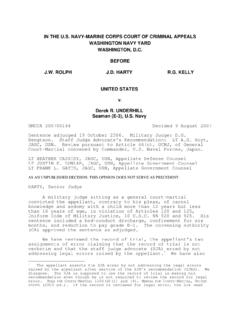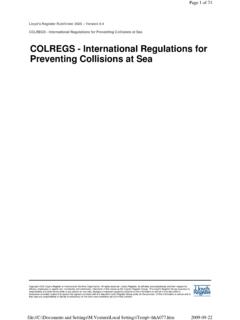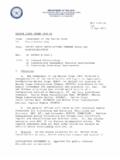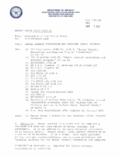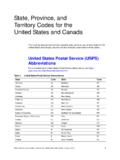Transcription of IN THE U.S. NAVY-MARINE CORPS COURT OF …
1 IN THE NAVY-MARINE CORPS COURT OF CRIMINAL APPEALS. WASHINGTON NAVY YARD. WASHINGTON, BEFORE. RITTER THOMPSON FELTHAM. Bryan D. BLACK. Lieutenant (O-3), U. S. Navy Petitioner v. UNITED STATES. Respondent NMCCA 200600043 Decided 15 May 2006. PETITION FOR EXTRAORDINARY RELIEF IN THE NATURE OF A WRIT OF. MANDAMUS. AS AN UNPUBLISHED DECISION, THIS OPINION DOES NOT SERVE AS PRECEDENT. RITTER, Senior Judge: The petitioner, a Navy lieutenant instructor at the United States Naval Academy, seeks extraordinary relief in the nature of a writ of mandamus under the All Writs Act, 28 1651(a). Specifically, he asks this COURT to: (1) direct the military judge to set aside the referral of charges and disqualify Vice Admiral (VADM) Rempt, the Superintendent of the United States Naval Academy, from convening the COURT -martial in this case; and (2) order production of a witness, Second Lieutentant (2Lt). Gabriella Swanson, USMC, since the military judge denied the petitioner's motion to compel production of the witness.
2 The petitioner also requested a stay of proceedings pending this COURT 's resolution of these issues, which we granted. The petitioner contends that VADM Rempt must be disqualified from acting as the convening authority in this case because he is an "accuser" within the meaning of Article 1(9), Uniform Code of Military Justice. That is, he both directed that the charges in this case be signed and sworn to by another, and has an interest "other than an official interest in the prosecution" of the petitioner. Art. 1(9), UCMJ. The petitioner also asserts that there has been apparent unlawful command influence that has affected this case. We have carefully considered the excellent briefs presented by both the petitioner and the Government. Additionally, we ordered the Government to provide an authenticated written transcript of the proceedings related to the petition, and have scrutinized that record. We conclude that the Superintendent is not an "accuser" in this case, and that the petitioner has not met his burden to show facts that, if true, constitute unlawful command influence.
3 See United States v. Biagase, 50 143. ( 1999). As to the petitioner's request for witness production, we conclude this issue is now moot. Because of a series of enlargements requested by both parties and granted by this COURT , the stay of proceedings has continued past the date 2Lt Swanson was expected to redeploy from Iraq back to the United States. Thus, the stated basis for her unavailability at trial no longer applies. Facts The petitioner, an instructor at the United States Naval Academy (USNA), participated in a summer training cruise for midshipmen of both genders during a period of several weeks spanning July and August of 2005. The charges pertain to offensive statements of a sexual nature that he allegedly made to or in front of midshipmen during the cruise. The last offensive comments were allegedly made on or about 13 August 2005. In September 2004, Congress created the Defense Task Force on Sexual Harassment and Violence at the Military Service Academies to explore ways to significantly reduce sexual harassment and violence at the Academies.
4 The Task Force completed and submitted its report in June 2005. The report was publicized in August, and the USNA public affairs office responded with a press release on 25. 1. August 2005. A meeting of the Naval Academy Board of Visitors was held in September 2005, at which Senator Barbara Mikulski and General Charles Krulak, USMC (Ret.) expressed dissatisfaction with the Naval Academy's efforts to curtail sexual harassment. In September 2005, Major Chris Thielemann, a Marine CORPS judge advocate, was assigned to conduct a preliminary investigation of the petitioner's conduct during the summer cruise. On 23 September 2005, the petitioner was notified that a hearing would be conducted pursuant to Article 15, UCMJ, 1. The Naval Academy Board of Visitors is a supervisory group consisting of members of Congress and presidential appointees. 2. pertaining to charges that had arisen from the preliminary investigation.
5 After consulting with counsel, the petitioner exercised his right to refuse nonjudicial punishment proceedings. LT Anne Marks, JAGC, USNR, preferred the charges on 17 October 2005. The convening authority then referred the case to a special COURT -martial. At an Article 39(a), UCMJ, hearing held on 13 January 2006, the petitioner moved to set aside the referral of charges and disqualify the Superintendent from acting as the convening authority in this case, contending that the latter was an accuser and that the charges were tainted by apparent unlawful command influence. The military judge denied the motion, making specific findings of fact, which we find to be fully supported by the record, and therefore adopt as our own. See Attachment (1). Law Under the All Writs Act, "all courts established by Act of Congress may issue all writs necessary or appropriate in aid of their respective jurisdictions and agreeable to the usages and principles of law.
6 " This COURT is thus empowered to grant extraordinary relief where appropriate. But a Writ of Mandamus is "a drastic remedy that should be used only in truly extraordinary situations." Aviz v. Carver, 36. 1026, 1028 ( 1993). It is generally disfavored because it disrupts the orderly process of appellate review that occurs only after the completion of a COURT -martial proceeding in which an accused has been convicted. McKinney v. Jarvis, 46 870, 873-74 (Army 1997). For that reason, "the petitioner bears the burden of demonstrating that he is entitled to [the extraordinary relief] as a clear and indisputable right.". Aviz, 36 at 1028; accord, Ross v. United States, 43 770, 771 ( 1995). Convening Authority as "Type Two" Accuser The petitioner contends that VADM Rempt is disqualified from acting as the convening authority in his case because: (1) he directed that the charges be prepared for nonjudicial punishment and, (2) after the petitioner refused Article 15, UCMJ, proceedings, VADM Rempt directed that the same charges be disposed of at a special COURT -martial.
7 The petitioner argues that in so doing, VADM Rempt directed that the charges "nominally be signed and sworn to by another," LT Marks, and became an accuser under the second clause of Article 1(9), UCMJ. We disagree. An accuser is prohibited from referring charges to a special or general COURT -martial. RULE FOR COURTS-MARTIAL 601(c), MANUAL FOR. COURTS-MARTIAL, UNITED STATES (2005 ed.). Article 1(9), UCMJ, defines an "accuser" as "a person who signs and swears to charges ["type one"], any person who directs that charges nominally be 3. signed and sworn to by another ["type two"], and any other person who has an interest other than an official interest in the prosecution of the accused ["type three"]." The test for determining whether a convening authority is an accuser is whether he "was so closely connected to the offense that a reasonable person would conclude that he had a personal interest in the matter.
8 " United States v. Gordon, 2 161, 167. ( 1952). Personal interests are those that relate to the convening authority's ego, family and personal property. United States v. Vorhees, 50 494, 499 ( 1999). LT Marks, who preferred the charges, testified on the motion that she never had a conversation with VADM Rempt about the petitioner's case. And no evidence was presented to suggest VADM. Rempt directed that charges be signed and sworn to by either LT. Marks or anyone else. In short, there is no factual basis for asserting that VADM Rempt directed that charges nominally be signed and sworn to by another. The petitioner's argument confuses and blends two very different legal acts: (1) the preferral of charges described in 307; and (2) the commander's disposition decision, described in 306. The commander's decision on forum for disposition is not conceptually the same thing as preferring charges. The latter involves a person swearing under oath that he or she has investigated specific allegations and believes them to be true.
9 307(b). The former is not a determination as to the truth or falsity of allegations at all, but merely a command assessment of the appropriate level to resolve the allegations. Moreover, the law is well-settled that a disposition decision does not make the decision maker an accuser. United States v. Grow, 11 77 ( 1953); United States v. Jewson, 5 80 ( 1952); United States v. Adams, 21. 733, 741 ( 1955). To hold otherwise would eviscerate the Manual for Courts-Martial scheme, by disqualifying every commander from referring charges against service members under his command after making an initial disposition decision. We thus find that VADM Rempt did not become a "type two" accuser as a result of his disposition decisions in the petitioner's case. Convening Authority as "Type Three" Accuser The petitioner next contends that VADM Rempt is also a "type three accuser" in that he has an other than official interest in the prosecution of this case.
10 We disagree. No evidence has been presented to suggest that VADM Rempt witnessed any of the events upon which the charges were based, that he was a victim of any of the charges, or that he has had any personal connection with either the petitioner, the alleged victim, or other midshipmen who may have overheard the 4. petitioner's alleged comments. The petitioner asserts only that VADM Rempt was "stung" by criticism from the Task Force report and the Naval Academy Board of Visitors, and asks us to infer from the timing of these unrelated events that the Superintendent has taken a personal interest in prosecuting the petitioner. We decline to infer, on the basis of unrelated events, that the convening authority has acted improperly in this case. More importantly, we find nothing in the record to indicate that he has acted with anything other than an official interest in this case. Unlawful Command Influence Although not expressly mentioned in the writ petition, the petitioner 2 inferred that this case was tainted by command influence.
